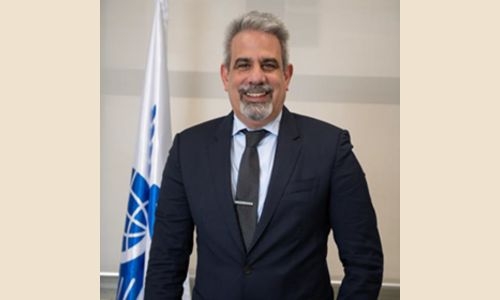IATA VP: Aviation a ‘double-edged sword’
TDT | Manama
The Daily Tribune – www.newsofbahrain.com
Email: ashen@newsobahrain.com
Kamil Alawadhi, IATA’s Re- gional Vice President for Africa and the Middle East presenting a frank assessment of the hurdles and potential for growth in aviation across Africa and the Middle East at the CEOs Insight programme.
Harsh Operating Environment
Alawadhi illustrated a bleak picture for airlines operating in Nigeria and across Africa, citing astronomical costs as nearly insurmountable barriers. “Leasing aircraft is two to three times more expensive; fuel is up to 20% costlier, and insurance costs are eight times higher than elsewhere,” he remarked, pointing to systemic factors, including high-interest rates on loans and a rigid supply chain, that make profitability a distant goal. While Nigeria’s economy relies heavily on-air traffic for revenue, the state policies exacerbate rather than alleviate the burden on airlines. This paradox, he noted, makes aviation a “double-edged sword” in the region, where governments benefit from industry-generated revenue yet implement policies that stymie airline viability.
Blocked Funds: A Chronic Financial Strain
Alawadhi pointed to the critical issue of blocked airline funds, a situation where airlines’ revenues are held in local currencies, often inaccessible for transfer into dollars. In one staggering instance, Nigerian banks held back as much as $865 million in airline funds, with a single carrier owed $330 million. “Airlines are forced to pay upfront for fuel, landing fees, and operational costs in dollars. When their revenues are frozen, it leaves them cash- strapped,” he said, describing IATA’s intervention to recover $1.2 billion of blocked funds this year. Despite progress, the total continues to build, currently estimated at $1.6 billion. “This undermines financial stability,” Alawadhi stressed, warning of how such constraints choke an airline’s capacity to grow or even sustain its operations.
Safety Standards and Regional Synergy
Turning to the Middle East, Alawadhi applauded the region’s aviation safety record, emphasizing that Middle Eastern carriers recorded one of the world’s highest safety standards in 2024, with less than one accident per million flights a stark contrast to Africa’s rate of six per million. He attributed the region’s success to a collaborative network of civil aviation authorities, airports, and airlines that address safety concerns with urgency. “The industry here understands that safety is our number one focus,” he noted, recognizing the role of IATA’s IOSA programme in advancing airline safety standards.
Training and Technology
IATA has also been ramping up initiatives to resolve aviation’s operational challenges, including the launch of its MRO Smart Hub, a digital platform designed to ease supply chain issues by connecting airlines in need of parts with those able to supply them. Training remains central to IATA’s mission, with new centres in Abu Dhabi and upcoming plans for Saudi Arabia to expand educational access. “This year, we reached our highest number of trained personnel,” he reported, under scoring the importance of skill development in an increasingly complex aviation landscape.
Unified Action
As a parting message, Alawadhi called for unity within the aviation ecosystem, urging airlines, airports, and regulatory bodies to align their goals for a prosperous industry. Reflecting on the potential he observed at the Dead Sea’s ACO AGM, he noted that while airlines may compete fiercely, collaboration is vital to overcoming today’s immense challenges. “The only time I’ve seen aviation leap forward is when civil aviation, airports, and airlines work together,” he said, encouraging stakeholders at the airshow to think beyond individual interests and act as one.
Related Posts

